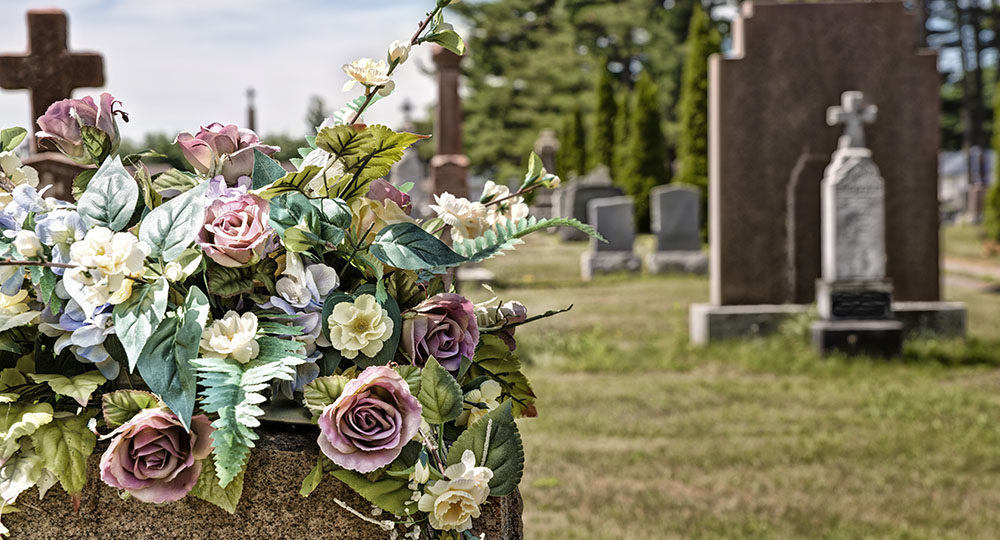Sardis, Alive But Dead Revelation 3:1–6
We have all attended funeral services at one time or another. In many cases, beautiful flowers are banked along an entire wall or occasionally cover all the walls of the room. They look so lovely and remind us of the many relatives and friends of the deceased—people who cared enough to share in the loss of a loved one or friend.
But a visit to the gravesite a day or two after the funeral, when the morning frost or the hot summer sun has touched those fragrant blooms, reveals that the beauty is gone. All that is left are some dried stems and, perhaps, the memory of how glorious they looked a few days earlier. They were blooms cut from their plants for a special occasion. Their beauty soon passed.
So it was with the church at Sardis. It had been so beautiful; its reputation had been excellent. People most likely came from far and near to attend the services, but its glowing reputation soon faded. This church was like cut flowers on a grave two days after the funeral: dead.
The Son Of Man Stands In Condemnation (v. 1)
In our Lord’s messages to the four churches preceding Sardis, there was some word of commendation; but there was no commendation for the church at Sardis.
“I know thy works, that thou hast a name that thou livest, and art dead” (v. 1b). Sardis had a good reputation. People thought the church was alive and well. But when the eyes of Jesus pierced through the outer shell to the hearts of the people, He pronounced the church “dead.” Although the reputation of previous ministry lived on, there was no life in Sardis now. The building was open, services were held as usual, but reality was gone.
As a youth, I was a member of such a church. It had a good reputation. The gospel had been preached there for years, but its message had drifted into oblivion. The life was gone, and the doors should have been closed. Today that church is still open and has a large congregation, but it is merely a facade. Spiritual death came to that assembly a long time ago.
It is so easy for churches to lose it all. Our Lord must grieve as He looks down on so many churches that are not only mere facades but are dead. That is tragic, and believers should not remain in such a church. However, it is even sadder when our personal Christian lives become like the flowers left at the grave—when we no longer have a vibrant walk with the Lord.
The Son of Man Stands in Correction (vv. 2–3)
Although the situation in the church of Sardis was hopeless, apparently there was a handful of people who were faithful to the Lord and had some type of spiritual walk. But even these people were about to be dragged under, for we read, “strengthen the things which remain, that are ready to die; for I have not found thy works perfect before God” (v. 2). The Lord corrected even their works lest their little light soon go out.
It is amazing how an unbelieving group can pull believers down so that they totally lose their testimony. Christians should be directing the unbelieving world to the Lord, but it often works the opposite way. Association with the world can pull down true believers. Satan is so powerful. Christians must maintain a constant walk with the Lord to stand true to Him. What are we as individuals doing about it?
The Son of Man Stands With A Promise (vv. 4–6)
Sardis was a commercial city located a long day’s journey southwest of Thyatira. It had grown wealthy through the textile, dye, and jewelry industries. We know that it was a center of pagan worship, for the ruins of a pagan temple still stand. This city was known for its loose living.
To the faithful few who held fast, were repentant, and did not defile themselves our Lord gave a special promise. “They shall walk with me in white; for they are worthy” (v. 4b). The white garments seem to denote their purity in the midst of an impure city. Divine recognition will be given to them in the future. They will be clothed like Christ, for they are declared by the Word of God to be “worthy.”
These faithful few teach a powerful lesson about living a pure life in the midst of the impure, corrupt world in which we live today. Simply reading advertisements for the literature of the day or watching a few moments of television tells the whole story. Perhaps the Lord has a special reward for us for purity. God help us to live a life that is pleasing to Him in the midst of the wickedness and perversion that surround us.
To say the least, this portion of Scripture has puzzled expositors. Some use it to claim that a person can lose his salvation. This would mean that our salvation is based on works rather than grace. This is a totally untenable position in light of other Scriptures that are clear on salvation by grace alone through faith. What, then, does this promise of Jesus mean?
One interpretation is that the “book of life” contains the names of all people who ever lived. The names of those who do not trust Christ are said to be blotted out at their death, for there is no second chance after that.
A clue to the meaning of this passage is found in the phrase, “He that overcometh.” The same beloved penman of Scripture, John, told us who the overcomer is: “For whatever is born of God overcometh the world; and this is the victory that overcometh the world, even our faith. Who is he that overcometh the world, but he that believeth that Jesus is the Son of God?” (1 Jn. 5:4–5).
The overcomer, the one whose name is not blotted out of the book of life, and the one who will walk with Christ in white are all believers in Jesus Christ. He confesses them before His Father. They belong to Him. What a marvelous relationship.
These dear believers, who were part of a troubled church, had put their faith in the Lord. They will therefore be given special recognition, even though the church from which they came had little or nothing to offer them.
The exhortations given to this first-century church must be heeded by every church and each individual believer today. We must pay close attention to developments in the world and the church, strengthen ourselves in the Lord, and remain faithful to Him. He, in turn, desires to reward us eternally.
Christ’s final challenge to the church at Sardis was “He that hath an ear, let him hear what the Spirit saith unto the churches” (v. 6). In essence, He was saying, Listen to what I say and take heed! Are we doing it?








